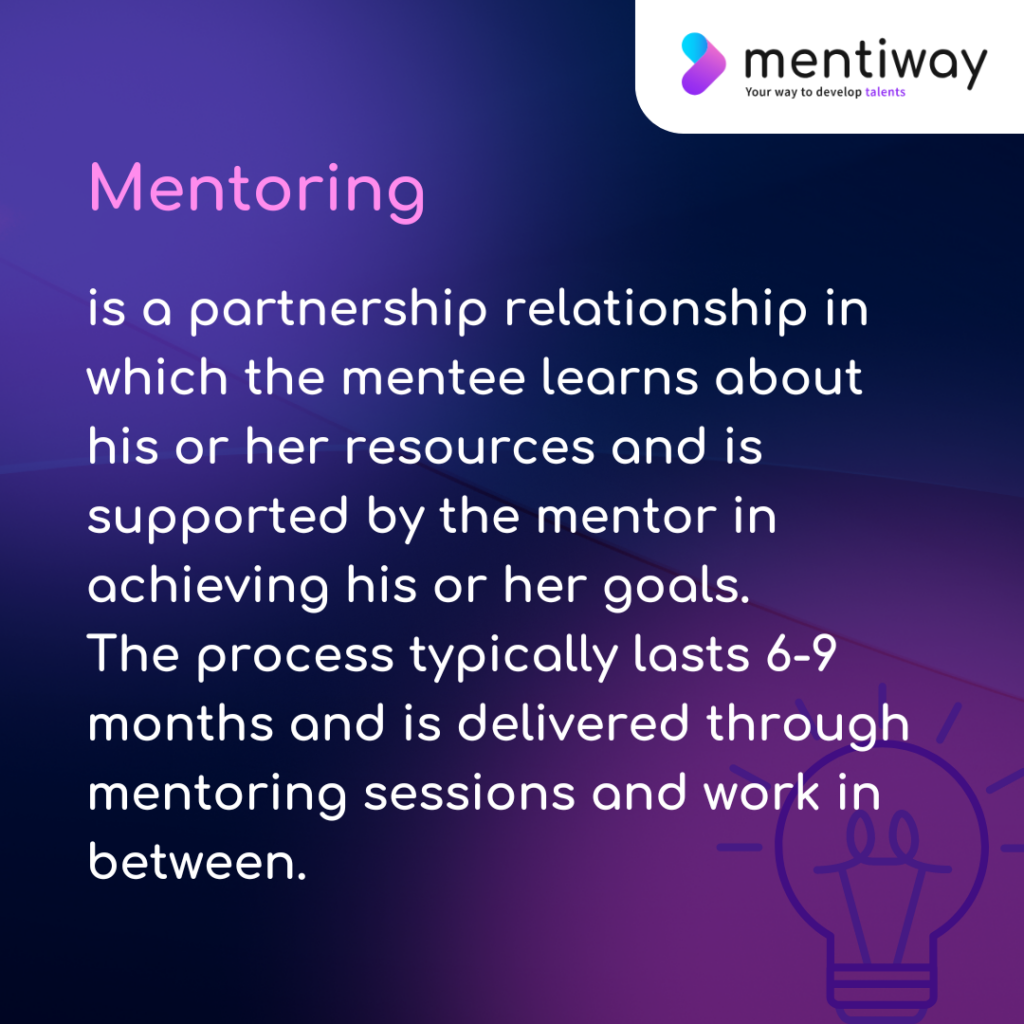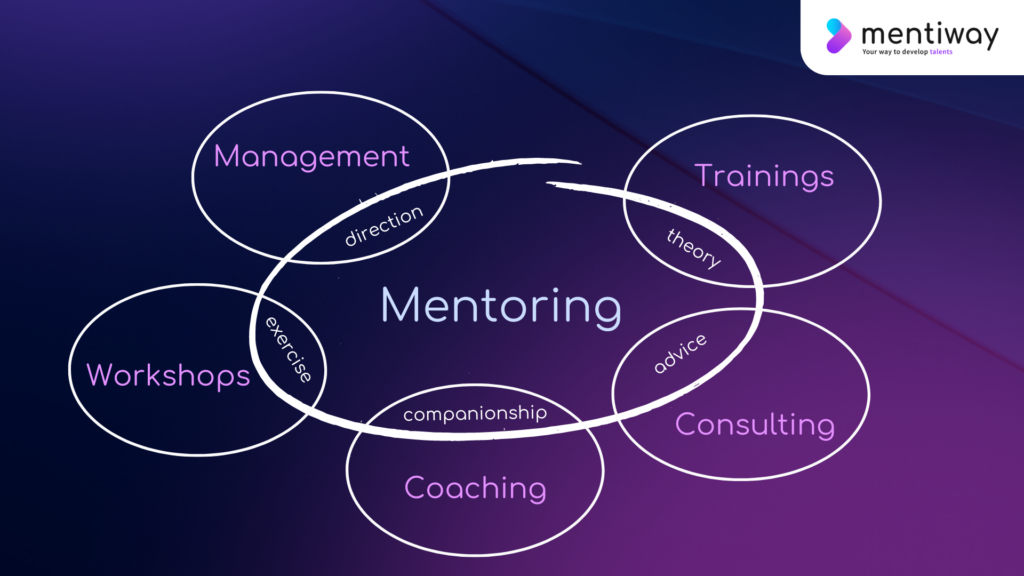Principles of good mentoring – an effective mentoring process
Mentoring is an extremely effective form of development, providing a myriad of benefits for both Mentees and Mentors and Mentorees. However, due to its still small popularity, its principles are sometimes unclear and confused with other methods of acquiring knowledge. In this article, I decided to list the most important, from my point of view, principles for implementing a good mentoring process.
How to conduct effective mentoring
At the outset, it is worth noting that this document deals with mentoring principles for the participants themselves – Mentors and Mentees. I have not included in it principles and recommendations for organizers of mentoring programs. You can read about it in this article, among others: Mentoring in the company.
The mentoring principles I have written down below were selected according to my subjective feelings. However, I believe they fully define how the mentoring process should be carried out, at least at the level of beginner mentoring pairs.
I have divided the rules into three categories:
- Before joining the mentoring program
- Understanding what mentoring
- Rethinking one’s own motivation to participate in the process
- Establish roles, responsibilities and rules of cooperation
- Stepping into the role of Mentee
- Stepping into the role of Mentor
- Contracting the principles of cooperation
- Carrying out the process
- Build a mentoring relationship
- Setting goals for the process
- Remembering the goals
- Evaluation and completion of the process
I describe each of the aforementioned principles below.
Fully understand what mentoring
Those joining a mentoring program for the first time should make sure they have a good understanding of what mentoring is.
I know from experience that Mentoring can be confused with other forms of development. For example, there are times when Mentees expect Mentors to solve their problems and tell them what to do. On the other hand, Mentors often tend to take over communication and focus excessively on telling what they did before and how.

I have already presented the definition of mentoring in a previous article: Mentoring – definition and practical approach.
In a nutshell, mentoring is a relationship and process in which Mentee learns about his or her resources, sets goals and grows supported by a Mentor. In other words, the Mentor does not train or tell how to do something. Mentor is only a companion in the Mentee’s self-development process.
On this occasion, it is also important to understand the roles of both Mentor and Mentee. This will be discussed later in the article.
Careful consideration of the motivation to participate in the process
The second principle – even before joining the program – is to answer the question why do I want to participate in mentoring at all. That is, on determining your real motivation for participating in the program and applies to both Mentees and Mentors.
It is worth spending a little more time on this process avoiding trite answers like “because I want to help others” or “because I want to develop myself.” Being honest about your motivation will help you enter the process in harmony with yourself. Besides, you will be able to return to this motivation in moments of doubt or declining commitment, and these are bound to happen.
An interesting technique to use at this stage might be 5x Why.
Stepping into the role of Mentee
Another principle is to understand your role and step into that role effectively.
The Mentee’s role is primarily:
- building self-awareness – learning about your resources and limitations, your motivations, analyzing your own behavior and beliefs,
- learning – development of knowledge and skills,
- implementation of goals set together with the Mentor.
To achieve this Mentee should:
- be motivated,
- Be open to a different point of view and to new ideas, concepts, attempts at behavior,
- be involved and attentive,
- take on challenges, test, try,
- learn from successes and failures,
- Initiate contact with the Mentor, be a proactive party in the process,
- Have a willingness to self-reflect, to think about their own behavior, thoughts and feelings.
Only such an attitude makes it possible to realize the mentoring process in an effective and efficient way for both parties.
Stepping into the role of Mentor
The same is true for the Mentor or Mentee. They, too, should understand their role before entering the process and behave in an appropriate manner already in the process itself.

I have written about the competencies and roles of Mentors before: Who is a Mentor.
In short, the role of Mentor is:
- Accompaniment
- Support
- Active listening
- Asking questions
- Analyzing applications
- Sharing these findings with Mentee
- Sharing your knowledge and experience
The mentor should definitely not be critical, impatient, should not impose or even suggest his own solutions.
Contracting the principles of cooperation
At the start of the mentoring relationship – during the first meeting – the couple should agree on the rules of cooperation. This is usually done by getting to know each other and signing a contract in the mentoring pair. There is a separate place for this in the Mentiway application, and both Mentee and Mentor sign the contract by clicking on the appropriate button.
Within the contract may be various arrangements, but the most common are:
- The principle of confidentiality.
- Declaration of joint commitment to the process.
- Define responsibilities and roles, including clear responsibility for scheduling meetings and recording notes.
- Consent to full attention during mentoring sessions.
- Determine availability -both in the form of meeting times and frequency, as well as the possibility of contact between sessions.
Build a mentoring relationship
During the first mentoring session, the couple also begins to form a mentoring relationship. This relationship will build throughout the process and its quality directly affects the effectiveness of the mentoring process and the comfort of the cooperation. You can also read about mentoring sessions in this article: What a mentoring session looks like and how long it takes.
Here are some tips on how to build an effective mentoring relationship:
- Take some time to “loose talk” – At the beginning of the process, get to know each other better, talk about your hobbies, what you do at work, what you like to do in your free time, etc. During the session, take care of a brief introduction – tell what has happened since the last session, comment on the weather, recent events, whatever interests you both.
- Ensure sincerity and openness -complete sincerity on your part is not only essential to the success of the process, but will more than likely elicit sincerity from your interlocutor as well.
- Don’t be afraid of feedback -both as a person giving feedback and as someone who receives such feedback.
- Be open to the other person’s point of view – even if you don’t agree with that point of view, accept it, analyze it, make a statement about it.
- Be 100% engaged and attentive during the mentoring session. Do not use electronic devices during this time. Do not drift away with your thoughts.
Setting goals for the mentoring process
When joining a mentoring program, the Mentee should already have some idea of her goals for participating in the program. These goals are usually specific competencies to be improved, or specific events that the Mentee would like to see happen during or at the end of the process.
These goals are usually very general at this stage and with unclear criteria for implementation. Therefore, the first two / three mentoring sessions should be devoted precisely to revision and clarification of these goals.
Clearly defined, achievable and well-measured goals are the foundation of any mentoring process.
You can read more about goals here: Objectives in mentoring – essence, techniques and examples.
Keeping targets in mind during meetings
Just as important as simply setting goals is keeping them in mind during mentoring sessions. Each session should have a goal / topic, which in turn should be directly related to the goal of the entire process. This ensures that the mentoring couple is confident that each successive meeting brings them closer to achieving their established goals.
It is also worthwhile at least once – halfway through the mentoring process – to spend a few minutes evaluating the achievement of goals so far. It’s worth asking yourself where on the path to achieving the goal we already are, what we’ve done, and what is still to be done.
In the Mentiway application, we have included a dedicated module in which the couple jointly assesses how they estimate achieving each of the specified goals.
Closure and evaluation of the process
The final principle of good mentoring is to formally end the process. This stage has several goals and benefits:
- The pair gives each other feedback on the entire process, which allows each person to learn lessons for the future.
- Mentoring participants evaluate the extent to which their goals have been met, identify what they have achieved and what remains to be achieved or done.
- The Mentor may suggest to the Mentee next steps for further development in the chosen area.
- The couple determines whether and to what extent they will contact each other in the future.
The formal end of the process is very important, because it allows a fairly objective assessment of the effectiveness of mentoring. The Mentee gets a summary and an action plan for the future, and the Mentor can analyze his/her effectiveness and take appropriate actions to develop in the subject of mentoring, coaching or simply leadership work.
Hi, my name is Thomas. I am the Co-Founder of Mentiway. We are happy to share our knowledge and support organisations on their way to success! 💪 If you are interested in how to efficiently and effectively implement a mentoring programme in your organisation using technology:








